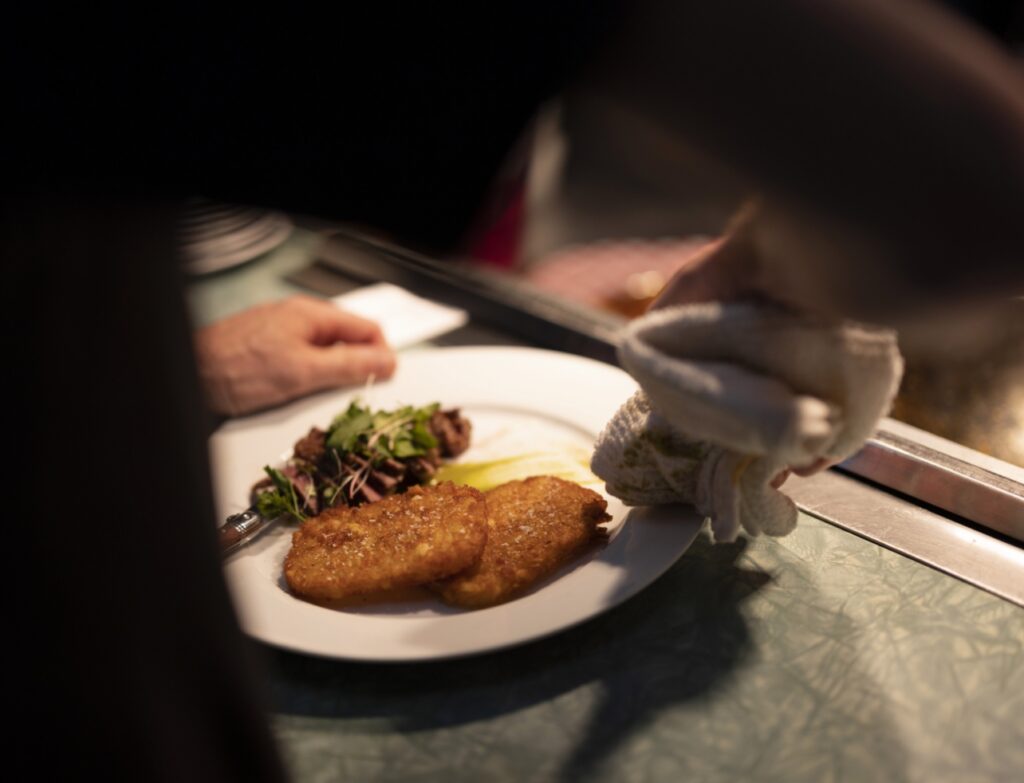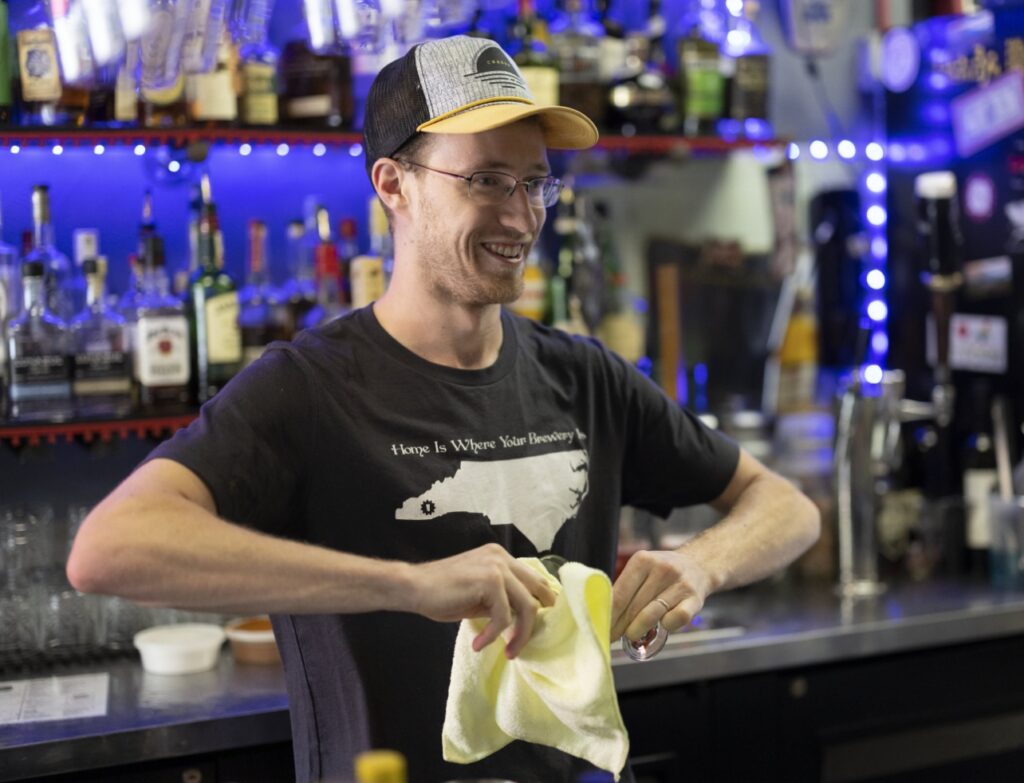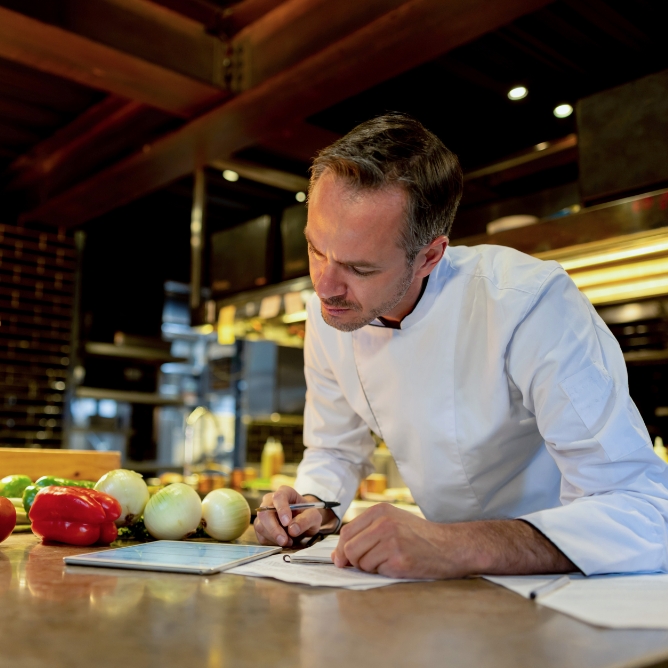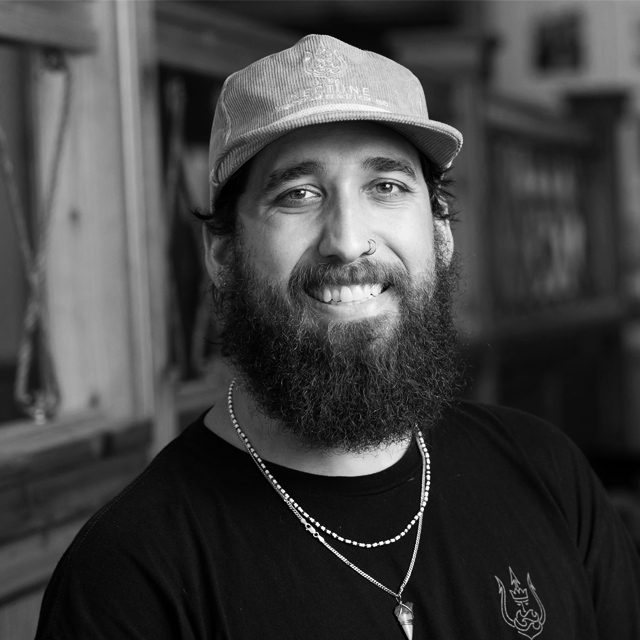Justin
Ard

FoH Shift Leader, Wait Staff, Tastee Diner
Ard’s career path
- Pizza Maker/Delivery
- Shift Leader
- Dishwasher
- Chef
- Kitchen Manager
- Porter
- FOH Shift Leader, Wait Staff

From Back to Front: Justin Ard Moves All Over the House
After years in the kitchen, he’s now serving as shift leader, wait staff, for a chef he’s long admired.
From his first job as a busser at age 14 to his current role as a front of house shift leader, Justin Ard’s restaurant career has consumed half his life. The 29-year-old’s journey encompasses a range of roles that include fast food pizza delivery to back of house positions with independently owned casual and fine dining restaurants throughout the state.
Each move seemed to organically lead to the next. The chefs in his network always know who’s opening a restaurant or who needs help.
“Every single job I ever had was, well, I knew this person, and they said to go here. And I met this person, and they said to go here. It just felt like the next chapter of a long book. And it felt normal; it felt good,” he says. “Honestly, now, if a personal friend didn’t refer me to a chef, it would feel weird.”
His current gig with a chef he’s long admired, Steven Goff, chef/owner of Tastee Diner in Asheville, marks his first front of house role in more than a decade. But he believes all his back of house experience helps him make a difference now.
It started with a love for food
Ard has fond memories of home-cooked meals with family around the dinner table. His mother wasn’t the best cook—in fact, her cooking skills are a running family joke—but his family hails from Louisiana, which means, as Ard explains, “Food is family. Family is food.”
“We didn’t have a lot growing up, but we had enough, and we were definitely at the table eating dinner together every night,” he says.
In high school, he was one of the only boys taking nutrition and home economics classes. When he was 14, he got that job bussing tables for a woman his mom bowled with. Her Italian restaurant in downtown Raleigh also catered events, so he gained experience as a busser, a server, and a pizza maker.
He surrounds himself with other food lovers inside and outside of the restaurant industry. Many of his friends own farmsteads and sell produce boxes.
“I love nutrition, and I love food,” he says.
Playing with knives and fire
In high school, he added a second job making and delivering pizzas for Little Caesars®.
“I’d get up at 5 or 6 a.m., make 700 pizzas, load them into my car, make time drops and collect checks, and manage all of the lunches for a lot of the high schools in Cary and Apex,” he says.

He eventually became a shift leader there and decided not to attend college after high school. He was juggling three restaurant jobs by then, but these were all just side hustles … until the day all the dishwashers walked out—midshift—at Travinia Italian Kitchen & Wine Bar, one of the restaurants. It was lunchtime on Mother’s Day, and tickets were pouring into the kitchen.
The general manager approached Ard and said that if he could help them out, he could get a shot at working in the kitchen.
“It was a three-bay sink with four line cooks that needed all their pots and pans scrubbed, and there was a dish pit that was stacked to the brim,” Ard recalls. “At first it was traumatizing.”
But he went to work. The executive chef covered his shirt and tie with a smock and changed shoes to help Ard, and it made a huge impression on him.
“He just starts running the dish pit with me and showing me how to do everything,” Ard says. “I think what hooked me was watching this businessperson—who, in my mind, must have gone to college because he was wearing a business suit—transition into foul-language, high-tension dish-pit mode. It was captivating, for sure. He did it all night long with me.”
That experience at Travinia put him on the path to becoming a chef, which was fun, he says.
“I got to play with knives and fire every day,” Ard says at the time, he thought, “I’ll do this for now until I figure out what I want.”
Ard enjoyed the fast pace in the kitchen and liked learning new things, including how to make food from scratch.
“I’m very, very much a nerd. So cooking is chemistry. It is a science,” he says. “It was fun, but it was slow. It was a slow process to love cooking.”
Chef life and finding his way
He began to love cooking—and restaurants—for the camaraderie that develops in those tough environments. The executive chef who helped him in the dish pit became his mentor and friend.
You go through something that’s very tense; you receive pain, burns, and cuts. When you come out the other side, alongside other people, alongside your team, you definitely feel a huge sense of relief, and it feels good.
“You go through something that’s very tense; you receive pain, burns, and cuts. When you come out the other side, alongside other people, alongside your team, you definitely feel a huge sense of relief, and it feels good,” Ard says.
By the time he was 18, Ard was a kitchen manager at Travinia and helped open two new locations in Virginia. This seemed to validate that he made the right decision about not going to college.
“I got paid to travel at such a young age, and I was teaching all these grown adults how to cook, and I could see the career path form, and that’s … when I could see my future,” he says.
Eventually, he left Travinia to take time off and again decide whether he wanted to continue in restaurants or go to college. Restaurants lured him back. He worked as a porter, then as a sous chef at a fine dining restaurant in Raleigh, where the food was incredible, but the work environment was demanding and dysfunctional. After a couple of years there, he went to Taaza Kitchen, a restaurant with a beautiful wood-fired kitchen. It was there that he began intentionally forming connections with other chefs.
Simultaneously, he helped open a small family-owned Italian pizzeria, where he earned a living wage and compensation for sick and vacation time for the first time in his career. It was around this time that he met a couple of chefs who had trained under Goff, for whom Ard works now. Ard had never met Goff but knew him by reputation and admired him from afar.
“Between all these jobs, I met all these different chefs, and I started noticing how small the chef bubble was across the whole state, across the whole Southeast,” Ard says. “It’s not that many people; it’s a very small world in the chef community, and Instagram helped make those connections, too.”
Six degrees of separation and finding his spot
Ard shared Goff’s philosophy about hospitality before they even met because he worked with chefs who had trained with Goff. But it was pure happenstance that he ended up on Goff’s doorstep in West Asheville.
When Ard first moved to the Asheville area, he drove a truck for a beverage company. When he decided to get back into restaurants, Ard reached out to his chef friend who told him about a friend of his who was opening a new restaurant. It was Goff.
Ard was stunned: “I was like, ‘Oh, that’s your friend? You mean your mentor? You mean your boss? You mean this enigma I’ve never met before? I would love to go meet him.’”
He showed up at Tastee Diner while it was still under construction, hoping to get a vibe check, but not expecting to get a job. Although Goff already had a sous chef, he didn’t have any front of house employees yet. To Goff’s surprise, Ard decided that’s where he wanted to work.
“I’ve been a sous chef my whole life, but I’m ready. Let’s do this,” Ard told him.
At this point, Ard was an established and skilled professional and knew what he wanted. He was willing to work four 10-hour shifts, Monday through Thursday. He wanted Friday through Sunday off to spend with his wife. Goff took notes as Ard talked. At the end of their conversation, Goff closed the notebook with his pen and rubber band and said, “OK, it’s yours. Let’s do this.”
“It was the easiest interview I’ve ever had,” Ard says.

Pro tips Q&A
Ard’s well-established restaurant career is anchored in kitchens. He’s using that experience, in addition to his early years of catering, to try to unify the front and back of house staff and enhance the dining experience for customers.
On missing the kitchen:
Q: Do you miss working in the kitchen?
A: Every day. Absolutely. Without a doubt. Of course, here, it’s an open kitchen. If they’re cooking something, they ask me to grab a spoon and taste it and talk to them about it. They might not change it—it’s their recipe. But cooks and chefs want critiques, otherwise it’ll never get better. And everyone’s opinion matters because everyone might order your dish, and everyone might want it a certain way, and then you have to choose where the compromise is.
On the divide between front and back of the house:
Q: What’s it like to go from the kitchen to out front as a server?
A: It’s a whole new skill set that I’ve seen my friends master that I had yet to do. And I’ve always had an appreciation for front of house staff. I’ve always hated that there’s a cultural divide. There’s an invisible wall between back of house and front of house, and it’s very rare when you find people who want both.
I’ve always had an appreciation for front of house staff. I’ve always hated that there’s a cultural divide. There’s an invisible wall between back of house and front of house, and it’s very rare when you find people who want both.
Usually, the only person in the room who wants both is the owner of the restaurant. So very rarely do you come across others like that, but I was ready for it. I’ve always done catering events. I’ve always done social activities. I was never forced to stay in the back of the restaurant, so I was always a part of it. I was always friends with servers. So, it came naturally to me by the time I got here, for sure.
On necessary skills:
Q: What skills do you bring to the front of the house from the kitchen?
A: Every one of them, literally every one of them. Specifically, here, there is no wall. Steven has worked very hard to make sure that the cooks get tipped out from the servers and the servers get food service from the cooks. They help run food if we need it, and we tip them out for it. Servers say hello when people come in, and the cooks say goodbye when people leave. So, it is intertwined here, which helps me. But I made it a mission that if I’m going to be waiting on a table, all the things I dealt with as a chef and as a cook aren’t going to happen to my cooks, I’m going to prevent that from happening.
Q: Can you elaborate?
A: Such as every ticket is printed the same way. I got to help build some of the spot-on POS system when I first showed up. So, programming the buttons into the computer in the language that cooks use, just so that we communicate easier. Whether it’s an acronym, whether it’s just the way it’s formatted.
If you wanted a burger and you said, “Well, I don’t like tomatoes, lettuce, and onions,” that’s half the toppings. A cook who might be weeded and struggling and is high stressed has to backwards-engineer to think one extra step and say, “OK, so that means you do want this, this, and this.”
When you ring in a ticket that way, that makes the cook do the thinking. Well, the guest and the server should be doing the thinking. So having buttons and having verbiage in there that makes the cook’s life easier was a goal. So, I took every skill I had with me onto the floor.
Especially when answering questions or managing dietary restrictions or nerding out about fun facts. Training people. It all transfers, absolutely.
Q: What skills are required to be a successful server?
A: It requires a very, very, very wide range of personalities. You’ve got to be able to communicate with all types of people, especially people you might not like. You’ve got to be able to talk to them, and you’ve got to be able to pick up on body language.
You’ve got to be able to empathize and predict the future about all sorts of types of people, let alone knowing everything your chef knows so that you can answer the questions at the table. Let alone learning how to be a sommelier so you can answer all your wine questions at the table. You have to empathize and know and be able to communicate all of that knowledge at the drop of a hat in the middle of a restaurant, which is insanely challenging to me. But it’s been fun to try and do it here, that’s for sure.
Q: Is it harder than being a chef?
A: I have huge admiration for anyone who’s a server. It’s a whole other skill set. I think it’s harder. I think that’s why I gravitated to the kitchen in the first place.
Search for your next career move today.
browse jobs







